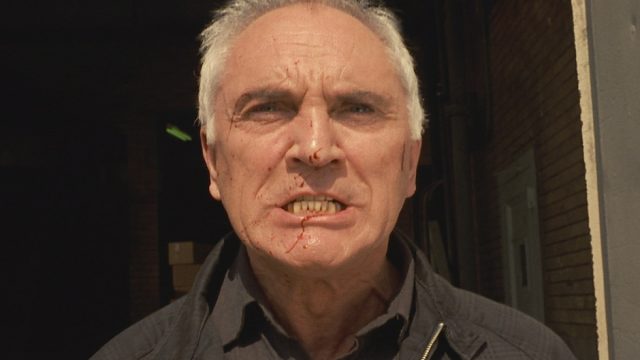How are you, my dumplings? Are you looking forward to Winter Solstice? Hanukah? Christmas? The final episode of Mr. Robot? Well, this is what Clytie is celebrating this week….
On the 13th, David Fear interviewed Stephen Soderbergh for Rolling Stone, in honor of the 20th anniversary of The Limey:
“Fucking with his legacy was consistent with who Peter [Fonda] was — he was the first person to poke holes in any sort of mythology that he felt was ridiculous or unearned. One of the things I like about The Limey is how much of Peter is in it. We’d be running a scene, there would be no marks for him to hit, and I’d just sort of let him go and have multiple cameras running. That way, if he ended up doing something off the cuff and great, I didn’t have to go back and ask him to do it again. His spirit really comes across in the film.”
Also on the 13th, Laura Tanenbaum of Jacobin, reviewed James Baldwin: Living in Fire, and discussed Baldwin’s radical life and work:
“Despite the FBI’s constant surveillance — and despite feeling torn between political journalism and his novels, plays, and essays — Baldwin managed to write and publish prolifically throughout his life before his death in 1987. He was a visible figure who penned best sellers, saw his work adapted to the stage, reported on civil rights, and wrote political journalism for everywhere from Freedomways (cofounded by W. E. B. Du Bois) to Mademoiselle, Esquire, and the New Yorker. (He also left behind a tantalizing range of unfinished or abandoned projects, including a script for a movie based on Malcolm X’s life that was published but never filmed, a novel about an Arab man deported from France to Algeria, and an exposé of the FBI’s COINTELPRO.)”
Michael Roffman of Consequence of Sound, spoke to Quentin Tarantino, on the 16th:
You know, normally, I’m kicking around an idea for a while. I keep kicking it around and keep trying to think it out, and think it out, and get more of my bearings, maybe try to think about the character. Then at some point, it’s like, ‘Okay, now enough kicking this can. It’s time to do something about it.’ And then I start just kind of investigating on the page. And one of the reasons that my first scenes are usually significant scenes, you know, is because it’s usually, ‘Okay, here we go.” The reason the first scenes are like that is because it’s a little bit of a leftover from back when I used to write scripts. I had to get people to read them. So, I only had so long to grab them before they go … ::make throwing noise … ‘Fuck this.’ I used to even tell people, ‘Just read the first three pages. If you don’t like it, stop reading after that.’ So, that was always my little writing modus operandi.
On the 17th, Brian Raftery talked to Tim Robinson, over at The Ringer:
“As Robinson’s time on SNL was winding down, cast member Jason Sudeikis—who was moving into TV production—asked whether he and Richardson would be interested in starring in a new show together. Robinson’s wobbly first season at SNL hadn’t scared him away from performing—he just didn’t want to have to do it on live TV. And, as it turned out, he and Richardson already knew the kind of series they’d want to make. ‘The first thing we said,’ recalls Richardson, ‘was that it had to be about Detroit, and it had to be about us being best friends.'”
Katharine Trendacosta of Gizmodo, discussed fandom going corporate in the 2010s, on the 19th:
“Fandom is big business these days. And while making money off of curatorial fandom and suppressing transformational fandom was the norm for big companies for years, that’s also changed. And by giving some transformational fandom its blessing—and taking some of the profits—corporations have also been able to exert a more subtle form of control over fandom than the legal threats of years ago.”
Finally, Lizzie Logan looked back on the career of Brittney Murphy, for Flood, also on the 19th:
“With lithe and ethereal Gwyneth Paltrow and Kirsten Dunst the It Girls of the day, Murphy wasn’t quite pretty enough to be a leading lady, and (I speculate) something about that flat twang in her voice kept her from the kind of highbrow British period pieces that mark the debut of a Serious Actress. So her star rose in fits and starts. After a string of unremarkable movies, she found success again with the now-cult-hit Drop Dead Gorgeous and the intense Girl, Interrupted, both released in 1999. Angelina Jolie so thoroughly steals the show in Girl, Interrupted that it’s easy to overlook the rest of the cast, but Murphy does good, subtle work, turning her natural sweetness and vulnerability into something horrifying, a tender exposed organ that’s gone gangrenous. Her character Daisy Randone, a good girl cursed with Obsessive Compulsive Disorder and a sexually abusive and manipulative father, commits suicide before the movie’s climax, so Murphy didn’t get enough screen time to merit awards consideration. But once again, she gets the most quotable line in the script: ‘Just give me the fucking valium.'”
Enjoy!

